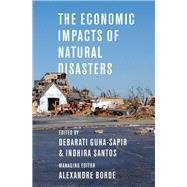The Economic Impacts of Natural Disasters
, by Guha-Sapir, Debarati; Santos, Indhira; Borde, Alexandre- ISBN: 9780199841936 | 0199841934
- Cover: Hardcover
- Copyright: 5/2/2013
Since the turn of the millennium, more than one million people have been killed and 2.3 billion others have been directly affected by natural disasters around the world. In cases like the 2010 Haiti earthquake or the 2004 Indian Ocean tsunami, these disasters have time and time again wrecked large populations and national infrastructures. While recognizing that improved rescue, evacuation, and disease control are crucial to reducing the effects of natural disasters, in the final analysis, poverty remains the main risk factor determining the long-term impact of natural hazards. Furthermore, natural disasters have themselves a tremendous impact on the poorest of the poor, who are often ill-prepared to deal with natural hazards and for whom a hurricane, an earthquake, or a drought can mean a permanent submersion in poverty. The Economic Impacts of Natural Disastersfocuses on these concerns for poverty and vulnerability. Written by a collection of esteemed scholars in disaster management and sustainable development, the report provides an overview of the general trends in natural disasters and their effects by focusing on a critical analysis of different methodologies used to assess the economic impact of natural disasters.Economic Impactspresents six national case studies (Bangladesh, Vietnam, India, Nicaragua, Japan and the Netherlands) and shows how household surveys and country-level macroeconomic data can analyze and quantify the economic impact of disasters. The researchers withinEconomic Impactshave created path-breaking work and have opened new avenues for thinking and debate to push forward the frontiers of knowledge on economics of natural disasters. "A great report and an important addition to the literature about the economics of disasters and the cost-effectiveness of prevention, mitigation and adaption, including a good number of interesting and relevant applications from developed and devloping countries."--Javier E. Baez, Independent Evaluation Group, The World Bank







